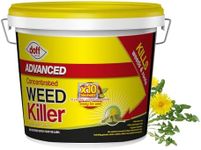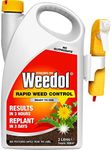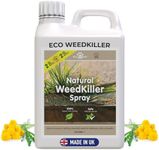Buying Guide for the Best Organic Weed Killers
Choosing the right organic weed killer can be a bit overwhelming, but with the right knowledge, you can find the perfect product to keep your garden healthy and weed-free. Organic weed killers are a great choice for those who want to avoid harmful chemicals and maintain an eco-friendly garden. Here are some key specifications to consider when selecting an organic weed killer, along with explanations to help you make an informed decision.Active IngredientsThe active ingredients in an organic weed killer are the substances that actually kill the weeds. Common active ingredients include vinegar, citric acid, and essential oils like clove or orange oil. These ingredients are important because they determine the effectiveness and safety of the product. If you have pets or children, you might prefer a weed killer with milder ingredients. For tougher weeds, look for products with stronger active ingredients.
Application MethodThe application method refers to how the weed killer is applied to the weeds. This can include spray bottles, concentrate solutions that need to be mixed with water, or granular products. The method is important because it affects ease of use and coverage area. For small gardens or spot treatments, a spray bottle might be sufficient. For larger areas, a concentrate that can be mixed and applied with a garden sprayer might be more efficient.
Effectiveness TimeEffectiveness time is how quickly the weed killer works after application. Some products show results within hours, while others may take a few days. This is important if you need quick results, for example, before a garden event. If you are not in a rush, a slower-acting product might be just as effective and potentially less harsh on your plants.
Residual EffectsResidual effects refer to how long the weed killer remains active in the soil after application. Some organic weed killers break down quickly and have no lasting effects, while others may continue to prevent weed growth for a longer period. This is important if you plan to plant new seeds or plants in the treated area soon after application. If you want to replant quickly, choose a product with minimal residual effects.
Safety for Surrounding PlantsSafety for surrounding plants is crucial if you have other plants or a lawn that you want to protect. Some organic weed killers are non-selective, meaning they will kill any plant they come into contact with, while others are selective and target only specific types of weeds. If you need to treat weeds in a flower bed or vegetable garden, look for a selective weed killer that won't harm your desired plants.
Environmental ImpactThe environmental impact of an organic weed killer includes its effects on soil health, water sources, and non-target organisms like beneficial insects. Organic products are generally better for the environment, but some may still have negative effects if overused. Consider products that are certified by environmental organizations or have minimal impact on non-target species. This is especially important if you are committed to sustainable gardening practices.















